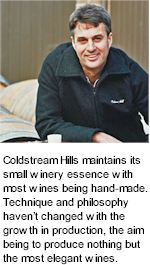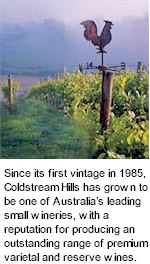


Coldstream Hills was established in 1985 by James and Suzanne Halliday. As a winemaker for over 30 years, James Halliday expressed his passion through involvements with other winemakers, devoting his time to crafting some of Australia's most memorable labels. From its initial vintage of 450 cases, Coldstream Hills has grown to become one of Australia's leading small wineries, its wines sold in some 16 countries and a reputation out of all proportion to its size. Coldstream Hills maintains its small winery essence with most of the wine literally being hand made. Situated in the cool and beautiful Yarra Valley, about one hour's drive east of Melbourne, its steep, close-planted vineyards have become a signature of the region. So too have its wines (most notably Chardonnays and Pinot Noirs) which reflect a climate cooler than Bordeaux and a little warmer than Burgundy.

France also provides all the oak barriques (1500, but increasing year by year) and no small amount of inspiration for the winemaking team. To create the specialties of the Coldstream Hills winery each year outstanding parcels of grapes are earmarked for special attention during making, using new French barriques.
The emphasis at Coldstream Hills is on the varietal fruit and length of flavour which the Yarra Valley bestows on each grape variety. The varietal wines are designed to be enjoyed upon release - attractive when young, but will certainly reward careful cellaring. The wines are quite literally, hand made, mainly using small open fermenters (of three to four tonnes capacity) for the red wines, while the white wines are barrel fermented.
These techniques are directed to making wines which are characterised by elegance and finesse, by silky supple texture, length of flavour, subtle oak and the ability to develop extra dimensions of complexity with bottle age. These are not weighty, extractive, tannic or alcoholic styles, however impressive well-made examples of these may be.

When the resulting wine is regarded as outstanding it forms the strictly limited quantity of wine bearing the Reserve label. While the fruit remains the driving force, there is more focus on structure and complexity. The Reserve wines are designed to improve for at least five years, and live for a decade or more.
Coldstream's founder James Halliday, is one of Australia's most distinguished wine journalists, consultants and judges. With two other Sydney lawyers, he founded Brokenwood in the Hunter Valley in 1970. After moving to Melbourne for his law firm in 1983, he and his wife established Coldstream Hills in 1985. He worked as a hands-on winemaker at Brokenwood, at Coldstream Hills, and several stints in France, before increasing age persuaded him that jumping in and out of open vats could be a terminal health hazard. As a journalist he has written over 45 books and several thousand newspaper and magazine articles, winning a number of major wine writing awards in Australia and the United States. He was also awarded Australia's most prestigious wine award - the Maurice O'Shea Award - for Outstanding Contribution to the Australian Wine Industry in 1995.
Not withstanding the glory and success, there has been and will be no significant change in the winemaking techniques or philosophies inherent to Coldstream Hills. The fruit is hand pruned and partially hand picked; the wine is made mainly using small open fermenters (of three to four tonnes capacity for the red wines, while the whites are principally barrel fermented). Winemaking techniques and philosophies haven’t changed with the growth in production either; all designed to produce elegant wines with a long finish.
